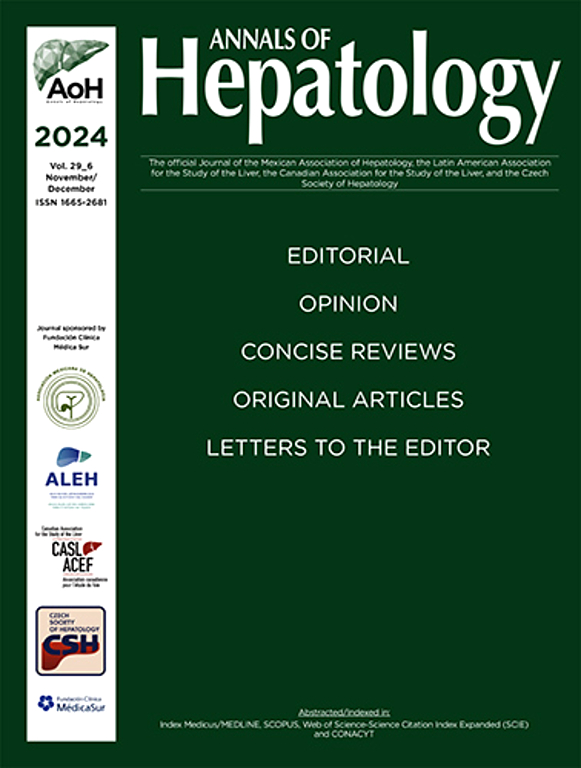人工智能用于肝细胞癌的生存预测:129例患者的临床数据驱动模型的开发和验证
IF 4.4
3区 医学
Q2 GASTROENTEROLOGY & HEPATOLOGY
引用次数: 0
摘要
前言和目的利用人工智能应用于广泛可用的临床和实验室数据,开发并验证肝细胞癌(HCC)伴代谢功能障碍相关脂肪变性肝病(MASLD)患者的预测生存模型。此外,将该模型的性能与HCC风险分层中常用的传统预后评分进行比较。材料与方法本回顾性研究纳入了129例确诊HCC并伴有潜在MASLD的患者。分析临床、实验室和肿瘤相关变量,包括代谢合并症、肝功能标志物、肿瘤负担、肝硬化相关并发症和已建立的预后评分(Child-Pugh、FIB-4和ALBI)。采用Cox比例风险回归与L2正则化建立预测模型,以管理高维数据并最小化过拟合。实现了XGBoost (Extreme Gradient Boosting)算法,将数据集随机分配到训练队列(80%)和内部验证队列(20%)。DeepSurv是一种基于深度学习的生存模型,也是一种补充策略。结果正则化Cox模型具有较强的预测能力,验证队列的一致性指数(C-index)为0.774。与生存率降低相关性最强的变量包括肿瘤血栓形成(HR 8.27)、肝性脑病(HR 4.66)和自发性细菌性腹膜炎(HR 6.51),均具有统计学意义。该模型优于广泛使用的预后评分,如BCLC、CLIP和ALBI,在HCC-MASLD患者的生存预测中显示出优越的判别能力。结论基于人工智能的模型,使用易于获取的临床和实验室数据,在预测HCC-MASLD患者的生存方面表现出优越的性能。这种方法可以实现更精确和可扩展的风险分层,在现实世界的临床实践中具有直接适用性。本文章由计算机程序翻译,如有差异,请以英文原文为准。
ARTIFICIAL INTELLIGENCE FOR SURVIVAL PREDICTION IN HEPATOCELLULAR CARCINOMA: DEVELOPMENT AND VALIDATION OF A CLINICAL DATA–DRIVEN MODEL IN A COHORT OF 129 PATIENTS
Introduction and Objectives
To develop and validate a predictive survival model for patients with hepatocellular carcinoma (HCC) associated with metabolic dysfunction–associated steatotic liver disease (MASLD), using artificial intelligence applied to widely available clinical and laboratory data. Additionally, to compare the model’s performance with traditional prognostic scores commonly used in HCC risk stratification.
Materials and Methods
This retrospective study included 129 patients with confirmed HCC and underlying MASLD. Clinical, laboratory, and tumor-related variables were analyzed, including metabolic comorbidities, liver function markers, tumor burden, cirrhosis-related complications, and established prognostic scores (Child-Pugh, FIB-4, and ALBI). The predictive model was built using Cox proportional hazards regression with L2 regularization to manage high-dimensional data and minimize overfitting. The XGBoost (Extreme Gradient Boosting) algorithm was implemented, with random allocation of the dataset into a training cohort (80%) and an internal validation cohort (20%). DeepSurv, a deep learning–based survival model, was also explored as a complementary strategy.
Results
The regularized Cox model demonstrated robust predictive performance, achieving a concordance index (C-index) of 0.774 in the validation cohort. The variables most strongly associated with reduced survival included tumor thrombosis (HR 8.27), hepatic encephalopathy (HR 4.66), and spontaneous bacterial peritonitis (HR 6.51), all statistically significant. The proposed model outperformed widely used prognostic scores such as BCLC, CLIP, and ALBI, showing superior discriminative ability for survival prediction in patients with HCC-MASLD.
Conclusions
The AI-based model, built using easily accessible clinical and laboratory data, demonstrated superior performance in predicting survival in patients with HCC-MASLD. This approach enables more precise and scalable risk stratification, with direct applicability in real-world clinical practice.
求助全文
通过发布文献求助,成功后即可免费获取论文全文。
去求助
来源期刊

Annals of hepatology
医学-胃肠肝病学
CiteScore
7.90
自引率
2.60%
发文量
183
审稿时长
4-8 weeks
期刊介绍:
Annals of Hepatology publishes original research on the biology and diseases of the liver in both humans and experimental models. Contributions may be submitted as regular articles. The journal also publishes concise reviews of both basic and clinical topics.
 求助内容:
求助内容: 应助结果提醒方式:
应助结果提醒方式:


